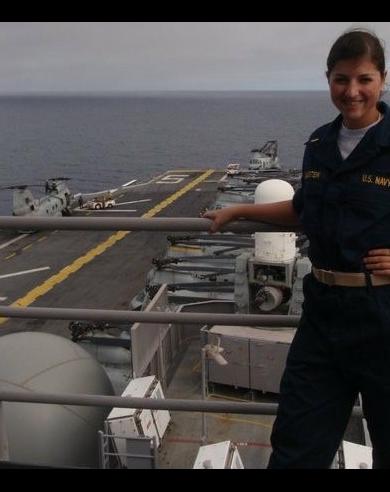Leader Spotlight: Andrea N. Goldstein
Our Leader Spotlights offer a glimpse into our diverse leaders: veterans who are continuing to serve their country and community in creative ways. Today, we profiled VFAI leader Andrea N. Goldstein, United States Navy veteran and Chief Executive Officer at Service to School. Fun fact: Andrea is also the co-host of a fabulous podcast, "2 Vets Upstate." Check it out here!
Tell me about your military service.
I was on active duty in the Navy from 2009 to 2016 and have been in the Reserves since. I’m an intelligence officer and have had the great fortune of a career that mixed the traditional and nontraditional. I’ve been exceptionally lucky to have had assignments that let me use both academic and life experience that I brought to the Navy.
I deployed to Japan (Humanitarian Relief 2011), on the USS Peleliu “WestPac” (Red Sea, Gulf of Aden, Arabian Gulf, Djibouti), and a land-based deployment managing some operations in the Arabian Gulf (Based in Bahrain). I also had a follow-on assignment with teams deployed in about half a dozen different countries around the world—so while I technically didn’t deploy, I was in a rotation visiting them almost constantly.
Military service was a calling. It was in my bones from the time I was about eight or nine years old. I wasn’t from a military family—I’m not sure where exactly it came from—and it took a long time (until I was 22) before I really felt like I could articulate to my family that it was something important I had to do. Some kind of service was a given. I am very, very lucky to have been born in the United States. I’m Jewish and my grandmother was a Holocaust survivor; my great-grandparents fled pogroms in Eastern Europe. My life is a promise kept, and so I felt obligated to pay that forward.
How did your service shape the person you are today?
My service made me realize that we are always an ambassador of some kind. There were very few people who had my kind of background in the military. I was constantly asked what I was doing there by both my teammates and my own community at home—the question came out of genuine curiosity. That prepared me for the same kinds of questions overseas—and I think it prepared me well for different kinds of advocacy work.
It was also very clear to me that often you have to accept that your job is going to be to fix problems so someone else can have it easy by comparison. That was a very tough pill to swallow at first, but once I accepted it, being someone who tries to right the wrongs so other people can take things for granted became very much part of who I am.
As a veteran, what sort of responsibility do you feel to speak up on issues that relate to American ideals?
We have to recognize that there’s great power bestowed in the tremendous respect America has for its military and veteran community. It’s our responsibility to use that power to build bridges. I live in a hamlet in upstate New York, where I have the opportunity to become friendly with people whom I would never have the opportunity to interact with otherwise because I’m a veteran. I also think it’s critically important to speak up because if we don’t, people will put words in our mouth or speak behind our backs. We fought to protect our right to free speech, guaranteed by the Constitution, and should exercise those rights!
Tell me about one issue related to those ideals that is of particular importance or concern to you right now. What are you doing about it?
This is a tough question because I see a lot of these issues as being interlinked. So, I’ll say showing how veterans issues are microcosms of “everyone issues”: housing insecurity, access to affordable, high quality healthcare, immigration reform-- but ones to which people will pay more attention because of the deep respect given to the military community.
When we talk about women veterans, we talk about transforming the face of leadership; when we talk about the GI Bill, we’re actually talking about affordable higher education and anti-poverty. In addition to my job leading a non-profit (Service to School) that prepares veterans for their next generation of leadership through peer-to-peer college application counseling, I also write fairly extensively. I have a regular column on Task & Purpose devoted to post-military life, and typically use that as a vehicle to get those ideas out there.
What would you say to other veterans about the role that they can play in these issues as citizens?
We all recall the very second we went from civilian to military—stepping off the bus at boot camp, taking the oath of enlistment or commissioning, putting on a uniform for the first time. But it doesn’t work the other way around: even if we have the DD-214, there’s no single moment where we feel like a civilian again. Service is in our soul, it will keep calling back to us, and our nation still needs us, so we need to find ways to get engaged—the more local the better.


